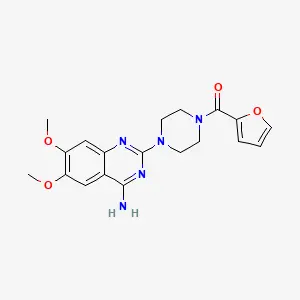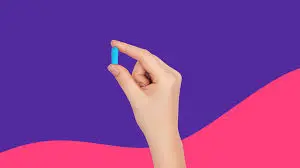Prazosin powder, derived from the medication prazosin, has gained attention for its potential to address sleep-related issues, particularly in individuals experiencing nightmares and sleep disturbances associated with post-traumatic stress disorder (PTSD). As an alpha-1 adrenergic receptor antagonist, prazosin was originally developed to treat high blood pressure. However, its off-label use for sleep-related problems has sparked interest among researchers and healthcare professionals. This blog post will explore the efficacy of prazosin powder in managing sleep problems and its potential benefits for those struggling with sleep disorders.
How does Prazosin Powder affect sleep quality?
Prazosin powder's impact on sleep quality is primarily attributed to its ability to block the effects of norepinephrine, a neurotransmitter associated with the "fight or flight" response. By reducing the activity of this stress-related chemical in the brain, prazosin may help create a more conducive environment for restful sleep. Studies have shown that prazosin can improve various aspects of sleep quality, including:
- Reduced nightmares: One of the most significant benefits of prazosin powder is its ability to decrease the frequency and intensity of nightmares, particularly in individuals with PTSD. By dampening the brain's stress response during sleep, prazosin may help prevent the occurrence of disturbing dreams that often disrupt sleep patterns.
- Increased total sleep time: Research has indicated that prazosin can lead to an increase in the overall duration of sleep. This is particularly beneficial for those who struggle with insomnia or frequently wake up during the night.
- Improved sleep efficiency: Prazosin powder may enhance sleep efficiency, which is the ratio of time spent asleep to the total time spent in bed. By reducing nighttime awakenings and promoting more continuous sleep, prazosin can help individuals achieve more restorative rest.
- Enhanced slow-wave sleep: Some studies suggest that prazosin may increase the amount of slow-wave sleep, also known as deep sleep. This stage of sleep is crucial for physical restoration and cognitive function.
It's important to note that while prazosin powder shows promise in improving sleep quality, its effects may vary from person to person. Factors such as dosage, individual physiology, and the underlying cause of sleep disturbances can all influence the medication's effectiveness. As with any medication, it's essential to consult with a healthcare professional before starting prazosin powder for sleep-related issues.
What is the recommended dosage of Prazosin Powder for sleep disorders?
Determining the appropriate dosage of prazosin powder for sleep disorders requires careful consideration and should be done under the guidance of a qualified healthcare provider. The dosage can vary depending on several factors, including the severity of sleep disturbances, individual response to the medication, and any underlying health conditions. However, some general guidelines and considerations for prazosin dosage in sleep disorders include:
- Starting dose: Typically, healthcare providers will start with a low dose of prazosin, often 1 mg taken at bedtime. This conservative approach allows the body to adjust to the medication and helps identify any potential side effects.
- Gradual titration: If the initial dose proves insufficient, the healthcare provider may gradually increase the dosage over time. This process, known as titration, helps find the optimal dose that provides the most benefit with minimal side effects.
- Typical dosage range: For sleep disorders, particularly those associated with PTSD-related nightmares, the effective dosage of prazosin can range from 1 mg to 15 mg per night. However, some individuals may require higher doses, up to 20 mg or more, depending on their specific needs and response to the medication.
- Timing of administration: Prazosin is usually taken at bedtime, approximately 30 minutes to 1 hour before sleep. This timing allows the medication to reach its peak effectiveness during the sleep period.
- Individual variations: It's important to recognize that the optimal dosage can vary significantly between individuals. Factors such as age, weight, metabolism, and concurrent medications can all influence the appropriate dose of prazosin powder.
When determining the dosage of prazosin powder for sleep disorders, healthcare providers will consider several factors:
- The severity and frequency of sleep disturbances
- The patient's medical history and any existing health conditions
- Potential drug interactions with other medications
- The patient's response to initial doses and any side effects experienced
It's crucial for patients to follow their healthcare provider's instructions carefully and report any changes in symptoms or side effects. Regular follow-up appointments may be necessary to assess the effectiveness of the treatment and make any required dosage adjustments. Additionally, patients should be aware that it may take several weeks to find the optimal dosage and experience the full benefits of prazosin powder for sleep disorders.
Are there any alternatives to Prazosin Powder for treating sleep problems?
While prazosin powder has shown promise in treating certain sleep problems, particularly those associated with PTSD and nightmares, it's not the only option available. There are several alternatives that individuals experiencing sleep issues may consider, depending on their specific symptoms and underlying causes. These alternatives can be broadly categorized into pharmacological and non-pharmacological approaches:
Pharmacological Alternatives:
- Traditional sleep medications: These include benzodiazepines (e.g., temazepam, lorazepam) and non-benzodiazepine hypnotics (e.g., zolpidem, eszopiclone). While effective for short-term use, these medications may have side effects and potential for dependence.
- Antidepressants: Certain antidepressants, such as trazodone or mirtazapine, have sedating properties and may be prescribed off-label for sleep issues, particularly when depression or anxiety is a contributing factor.
- Melatonin agonists: Medications like ramelteon work by mimicking the effects of melatonin, the body's natural sleep hormone, and may be helpful for some individuals with insomnia.
- Orexin receptor antagonists: Newer medications like suvorexant and lemborexant target the brain's wake-promoting system and may be effective for certain types of insomnia.
Non-Pharmacological Alternatives:
- Cognitive Behavioral Therapy for Insomnia (CBT-I): This structured program helps identify and replace thoughts and behaviors that cause or worsen sleep problems with habits that promote sound sleep. CBT-I is considered a first-line treatment for chronic insomnia and has shown long-lasting benefits.
- Sleep hygiene improvements: This involves making lifestyle and environmental changes to promote better sleep, such as maintaining a consistent sleep schedule, creating a relaxing bedtime routine, and optimizing the sleep environment.
- Relaxation techniques: Practices such as progressive muscle relaxation, deep breathing exercises, and mindfulness meditation can help reduce stress and promote relaxation, potentially improving sleep quality.
- Light therapy: For individuals with circadian rhythm disorders, exposure to bright light at specific times can help regulate the sleep-wake cycle.
- Exercise: Regular physical activity, particularly when performed earlier in the day, can improve sleep quality and duration.
- Herbal supplements: Some people find relief with natural remedies such as valerian root, chamomile tea, or magnesium supplements. However, the efficacy of these alternatives varies, and it's important to consult with a healthcare provider before using any supplements.
When considering alternatives to prazosin powder for sleep problems, it's essential to work closely with a healthcare provider to determine the most appropriate approach. The choice of treatment should be based on the specific type of sleep disorder, underlying causes, individual health status, and personal preferences. In many cases, a combination of pharmacological and non-pharmacological approaches may be most effective in addressing sleep issues comprehensively.
It's worth noting that for individuals with PTSD-related nightmares, prazosin powder may still be one of the more effective options available. However, for those with other types of sleep disorders or those who do not respond well to prazosin, exploring these alternatives can be beneficial. The goal is to find a safe, effective, and sustainable solution that improves sleep quality and overall well-being.
If you are also interested in this product and want to know more product details, or want to know about other related products, please feel free to contact iceyqiang@aliyun.com.
References:
- Raskind, M. A., et al. (2013). A parallel group placebo controlled study of prazosin for trauma nightmares and sleep disturbance in combat veterans with post-traumatic stress disorder. Biological Psychiatry, 73(12), 1031-1037.
- Khachatryan, D., et al. (2016). Prazosin for treating sleep disturbances in adults with posttraumatic stress disorder: a systematic review and meta-analysis of randomized controlled trials. General Hospital Psychiatry, 39, 46-52.
- Waltman, S. H., et al. (2018). The use of prazosin for the treatment of trauma nightmares and sleep disturbance in combat veterans with post-traumatic stress disorder. Military Medicine, 183(1-2), e144-e149.
- Koola, M. M., et al. (2014). Therapeutic mechanisms of prazosin in post-traumatic stress disorder. Journal of Clinical Psychopharmacology, 34(5), 643-646.
- Morin, C. M., et al. (2006). Psychological and behavioral treatment of insomnia: update of the recent evidence (1998–2004). Sleep, 29(11), 1398-1414.
- Schutte-Rodin, S., et al. (2008). Clinical guideline for the evaluation and management of chronic insomnia in adults. Journal of Clinical Sleep Medicine, 4(5), 487-504.
- Sateia, M. J., et al. (2017). Clinical practice guideline for the pharmacologic treatment of chronic insomnia in adults: an American Academy of Sleep Medicine clinical practice guideline. Journal of Clinical Sleep Medicine, 13(2), 307-349.
- Krystal, A. D., et al. (2019). New developments in the management of insomnia. Dialogues in Clinical Neuroscience, 21(1), 49-62.
- Buysse, D. J. (2013). Insomnia. JAMA, 309(7), 706-716.
- Taylor, D. J., et al. (2014). A pilot randomized controlled trial of the effects of cognitive-behavioral therapy for insomnia on sleep and daytime functioning in college students. Behavior Therapy, 45(3), 376-389.



